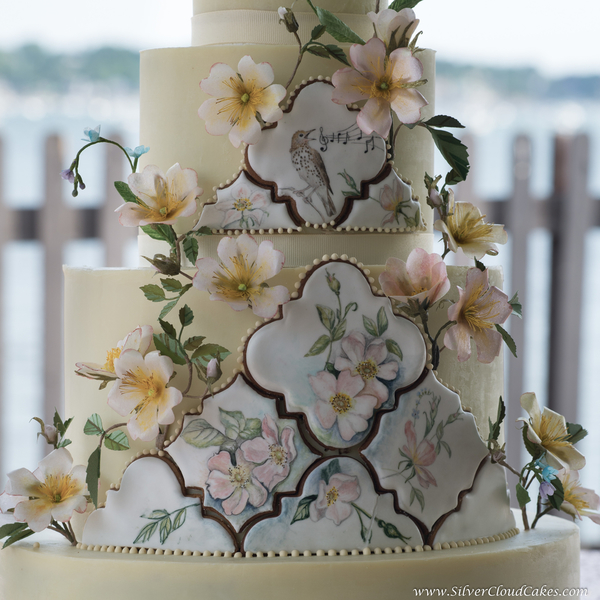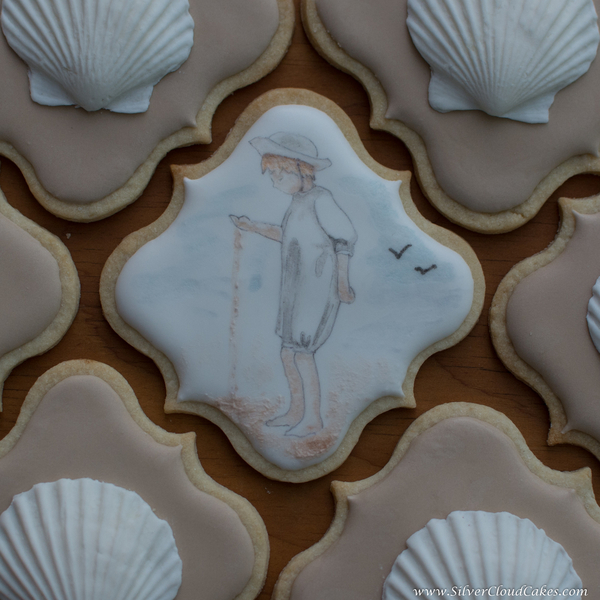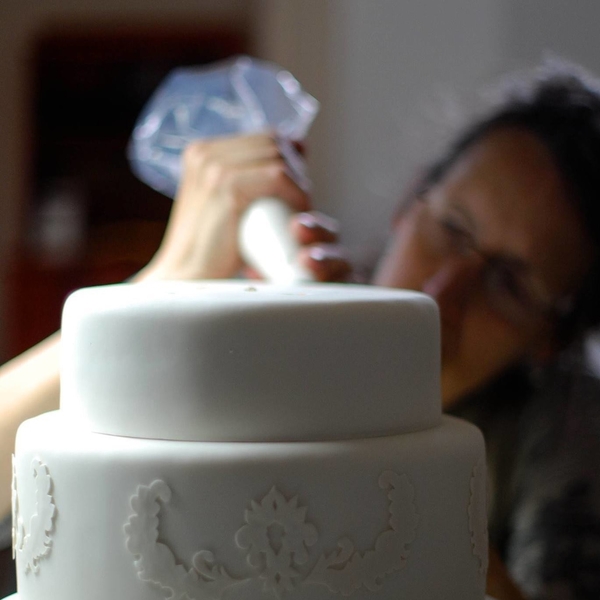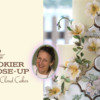I really love these Cookier Close-ups, because they give me an excuse to get to know some very interesting and talented decorators in a way that I probably couldn’t otherwise. (Of course, there’s no rule that says people need to answer my every probing question, but, lucky me, most do! ![]() ) This month, we’re super fortunate to be joined by Barbara Smith, owner of Silver Cloud Cakes and our June site artist (whose lovely painted June art is depicted immediately below).
) This month, we’re super fortunate to be joined by Barbara Smith, owner of Silver Cloud Cakes and our June site artist (whose lovely painted June art is depicted immediately below).
I know, I know, it took forever for me to publish this interview, but, I assure you, you won't be disappointed. Barbara went the extra mile to answer each and every question super thoroughly! But, before we get into the Q&A, just a quick recap of Barbara's cookie history . . .
Back in June when Barbara’s art posted, we learned in the related forum post that Barbara harks from Manchester-by-the-Sea, Massachusetts (USA) and started decorating cakes back in 2010. Only relatively recently, in 2016, did she decorate her first cookies, and she’s been hooked ever since! Barbara’s business, Silver Cloud Cakes, is still primarily focused on cakes as its name suggests, but she admits that cookies are “uniquely personal and intimate . . . customers can hold their own specially designed and decorated piece of art in their hands.” So true, Barbara!
In this Close-up, we’ll pick up where we left off in that forum post by exploring the daily operations of Silver Cloud Cakes, and then we’ll go from there!
![]()
JMU: Hi, Barbara! Thank you again for your wonderful June art submission, and for visiting with me here again on Cookie Connection. To kick off, I’d love to gather a little more background about Silver Cloud Cakes. Is it a home-based business, or one that operates out of a separate brick-and-mortar location? Why did you decide to locate/operate it this way?
![]()
BS: Thank you, Julia, for inviting me to your Cookier Close-up. Silver Cloud Cakes operates out of my home here in Manchester-by-the-Sea. My first introduction to cake decorating was after we had raised our three children when my mother, who had dementia at the time, was staying with me. I worked from home on my job in software development, and Mom would sit quietly at the dining room table with me. When I wasn’t working, Mom’s repeated questions were quite tiring; so after finishing for the day, I would sometimes pretend to be working but surreptitiously surf the web. Amazon was brand new, and I quickly discovered that I could press the button and get a package at my door the next day without having to first bundle up my mom and cajole her into the car. One of the first books I got was Alison Procter’s Simplifying Sugar Flowers. Her flowers were gorgeous. I thought, “I could do that!” I pushed the button again and ingredients came via Amazon and that is how I started decorating cakes. I needed to be home, so I looked into getting a kitchen license from our town.
![]()
JMU: And how big is your business? How many employees, if any, do you have? How many cakes and cookies do you decorate in an average month? Also, about what percent of your revenue is cakes versus cookies versus other sweets?
![]()
BS: My kitchen license does not allow me to hire anyone with the exception of family, so that makes me and my photographer-husband the only employees of my small business. A wedding cake or big event cake will usually take me about two weeks from start to finish. I am retired, so I take it easy and only make two or so cakes a month during wedding season. I prefer to spend time making decorations as beautiful, intricate, and joyous as possible. I am still working to grow my cookie business, but there is a limited market for the time-consuming work that my designs require. While people here remember and rave about my cookies for years, they are not used to paying for artwork on cookies! I would say the same is true of smaller cakes, which is why I switched a while back to only offering wedding or other large-event cakes along with cookies.
![]()
JMU: Apart from the ability to command a larger price premium for wedding and large-event cakes, is there some other reason for this business focus? Is cake decorating intrinsically more interesting than cookie decorating to you?
![]()
BS: If I had to choose, I would prefer cookies over cakes for several reasons. There is so much more art and design work involved on 200 (mostly different) cookies than on a cake that serves the same number. It is the art, design, and craft work that gives me the most pleasure. Another reason I prefer cookie decorating is that the themes for cookies typically allow more scope than cakes do. And finally, the tedious task of baking, filling, and covering a perfect cake “canvas” and the stressful timeline involved when it is out of the fridge, especially in summer, is something that makes cookie problems (and I know they have them) look smaller in comparison! This is particularly true for a home cake baker without professional refrigerators or dedicated air-conditioned space. Having said all that, I think making both cakes and cookies is optimal for me!
![]()
JMU: Do you foresee making relatively more cookies (i.e., proportionally, relative to cakes) in the next couple of years? In other words, do you foresee any change in your business mix? Why or why not?
![]()
BS: Well, I am trying to build up my cookie business, but the cookie craze has not really hit this area yet, and it is an uphill battle. I love decorating cookies, but right now the cakes bring in the customers.
![]()
JMU: Looking back now to when you first started the business, can you describe two or three of the biggest challenges you had in getting the business off the ground, and how you dealt with or overcame those challenges?
![]()
BS: I would say my credibility, my confidence, and a thin portfolio were my main hurdles at first. I offer cake tastings in our historic 1820 brick Federal home, and customers are either enchanted or put off by the non-standard aspect. I will never forget my first wedding couple. They were of the enchanted kind, but wary of my abilities. (And deep down, I had my doubts too!) I showed them a porcelain peony, and said I could make that peony out of sugar. They were dubious. I knew that I could, and I blurted out, “Yes! I CAN make that out of sugar.” They were wary but gave me a chance. I delivered! I am still grateful to them for trusting me with their precious wedding cake (pictured below).
Eventually, my confidence and my portfolio grew and now I confess that sometimes I feel that I am interviewing the customer for the sale . . . But isn’t there a need for the baker to interview his/her customer, at least a little, in any good baker/customer fit?
![]()
JMU: GORGEOUS! How silly they were to doubt you! ![]() At present, what are the biggest challenges you are confronting with respect to growing your business? How are you (or do you plan to) address and overcome those challenges?
At present, what are the biggest challenges you are confronting with respect to growing your business? How are you (or do you plan to) address and overcome those challenges?
![]()
BS: I am actually pretty happy with the number of cake inquiries and sales I am currently getting. In fact, I turn down a lot of them for lack of time. I don’t want to compromise the quality of my work by taking on too many at a time. I would like to grow the cookie part of my business, however. To do that, when I have the opportunity and time, I donate my cookies to fundraisers like the Audubon Society and various museums that have a select clientele. Fundraisers, even of the “select” kind, don’t necessarily bring me immediate sales, but I do find my name is getting out there. I find that people are far more likely to call you if they have heard of you before.
![]()
JMU: Ooh, the Audubon Society is a perfect fit for you with all the flora and fauna that you recreate! Let’s move from business to decorating now. How easy was it (and is it on an ongoing basis) for you to cross over from cake decorating to cookie decorating? Do you find they require much of the same skills, or are very different skills or techniques required, in your opinion? Are there certain features of cookies, cookie baking, or cookie decorating that make cookies more (or less) challenging than baking and decorating cakes?
![]()
BS: There are so many techniques and materials to learn in both arts! Cake decorating gave me a basic familiarity with wafer paper, fondant, petal dusts, silicone molds, etc. The hardest part of cookie decorating for me has been working with royal icing. I use royal icing in cake decorating, but not as exactingly nor as precisely. A canvas as small as a cookie does not allow much error. While I am eager to explore many more aspects of cookie decorating, right now I am simply flooding and painting them (well except for the occasional gingerbread estate)!
Another advantage of cookies over cakes is that there is the possibility of mailing them to a larger audience. Cakes, on the other hand, are difficult to mail. The option to mail cookies opens up a much bigger market - as well as more competition! Mailing out of state requires a state license. Right now, a town license is all that I need as long as I only sell in my state. So that is something I may explore later.
The design aspect of cookies versus cakes is quite different mainly because of the difference in scale. Event cakes are usually first seen from across the room. In my opinion, the design should compel you, even from that distance, to draw closer and then reward you by delighting the eye with beautiful detail - even under close inspection. So event cakes need both large design elements and tiny details that all work harmoniously together. That said, I design some of my cakes to include cookies, as shown below.
![]()
JMU: As you mentioned earlier, you do lot of handpainting on your cookies, all applied with a very delicate and lovely touch. Why have you gravitated toward handpainting cookies? Do you have a formal art/painting background or are you self-trained? If the latter, how did you acquire and develop your clearly refined painting skills?
![]()
BS: Thank you for the compliment, Julia. I do not have any formal art background, but I have been a crafter all my life. I am a photographer as well, so the handpainting allows me to design using some of my own photographs. It occurred to me that handpainting would be a way to enter the decorated cookie world with a minimum of expertise. Another reason I like handpainting is that, to me, cookies are all about tiny detail and that is one way I can attain it without being required to get the perfect royal icing consistency – my nemesis!
One help in my cookie painting was an online watercolor painting class by Anna Mason called Botanical Watercolors. She has a technique that transfers well to the type of cookie painting that I do, and she is an excellent teacher.
![]()
JMU: I’ve heard different schools of thought about how to prep one’s royal icing basecoat in order to best and most easily paint it. Some cookie artists suggest icing no more than one day prior to painting. Others suggest adding corn syrup to make a shinier, slicker surface. Still others recommend speed-drying the icing in a dehydrator (or by other methods) to achieve a similar surface. What method, if any, do you use to prep the icing surface, and why?
![]()
BS: I bought and read the book on royal icing written by the baker to the queen, but it is your book, Ultimate Cookies, to which I turn every time I use royal icing. (And your use of royal icing “glue” is absolutely genius. I often wonder if you invented it.) I haven’t tried adding corn syrup, but I do find that using a dehydrator makes for a much harder, shinier surface that is less prone to dissolving under the “paint.” Other than that, I do no other preparation of the icing surface.
![]()
JMU: Thanks for the book shout-out! It's possible that I coined the term "icing glue", but I doubt that I invented the medium! I'm still too young to have done that, as hard as that may be to believe! ![]() Now, what type of food coloring do you use to paint on cookies, and why? Do you thin it at all with alcohol or water? Why, or why not? And under what circumstances do you thin colorings, if you do?
Now, what type of food coloring do you use to paint on cookies, and why? Do you thin it at all with alcohol or water? Why, or why not? And under what circumstances do you thin colorings, if you do?
![]()
BS: I use both gel colors and dust colors mixed with alcohol and/or water. The alcohol dries quickly in the palette as well as on the cookie, so the intensity of the color in the palette changes as you are working. This can be a problem with skin color, for example. For that reason, I mostly use water but if it is critical that the area on the cookie dry quickly, I will use alcohol or some combination of water and alcohol instead.
![]()
JMU: What types of paint brushes would you recommend that a beginner painter acquire in order to get started with handpainting, and why? What brushes do you most commonly use, if different than those you previously mentioned, and why?
![]()
BS: I prefer moderately expensive brushes and take good care of them so they will last. For my style, I get the very smallest ones I can. One that I like is the da Vinci Watercolor Series 36 round Russian red sable paint brush (size 10/0), which I found on Amazon. I prefer to use extra fine edible markers and a light hand when I need a thin fine line. The Rainbow Dust Food Art Pen line is very good. Another type of brush that is useful is the fan shape. I like to use it when I am painting water, for example, like in the cookies below.
![]()
JMU: What other tips would you give to beginner painters to help them start off on the right foot with cookie painting?
![]()
BS: I think the most important thing – and it took me a long time to discover and practice this – is to keep the brush as dry as possible. One exception is when I need a watery effect like I mentioned above. In that case, I will use alcohol with more liquid on the brush than usual and my fan brush. But, you only get ONE stroke on the icing. You can’t go back and fix or fiddle with it - just one very quick stroke. Because the colors are so sheer, painting on anything other than pure white is difficult. I also discovered that first painting the design in the same scale on paper is helpful in spotting composition and design problems and working out final colors. As an example, below I've included a picture of a test-paint on paper followed by an image of the finished cookie.
![]()
JMU: Thank you for those excellent tips! Now, onto a few final (and bigger picture) questions! How do you think the cake community differs, if at all, from the cookie community? Which aspects of each, if any, would you want to translate into the other, and why?
![]()
BS: I work mostly on my own, but found internet forums were critically important when I began baking large cakes in my home and needed to troubleshoot. For cookie troubleshooting, nothing beats the Cookie Connection community!
![]()
JMU: Well, thank you! ❤️ I pour my heart and soul into this site, so that comment truly means a lot to me. Where would you like to see your business, Silver Cloud Cakes, in a few years? What are your dreams and aspirations as a sugar artist?
![]()
BS: Because I am retired, I have somewhat different goals than most bakers. If I were younger, I would have more ambitions for making money, but, for now, I do it because I love it. I love expressing my love of nature and wildlife, and of line and color.
I do have to ask myself now and then why I spend so much time on, and stress so much about, these cakes and cookies if not for the money. I love delivering a cake or cookies that I know will delight customers and will express our combined ideas in a beautiful way to their guests. I enjoy the collaboration as well as the art and craft.
While my aspirations seem modest, I know that the better my reputation is, the more freedom I will have in my work. I have made enough of a name for myself that I have the luxury of selecting those customers who I think have the same, or at least compatible, aesthetic. Those customers will have more faith in me and trust me to “edit” and “refine” their ideas (and try new things) while keeping their priorities in mind. My ambition is to retain enough control of my work to earn a reputation for consistent, beautiful, and elegant work. I guess I have ambitious goals after all!
![]()
JMU: Oh, Barbara! Thanks so much for such a thorough interview and all the very useful tips and links! From your sugar flowers and cakes to the cookies that often grace their sides, your work is simply exquisite! I can't wait to reveal more of your site art in December! (P.S. Thanks for submitting cookies for our banner and backdrop again!)
To learn more about Barbara, please visit her website, and her Facebook and Instagram pages.
Cookie and photo credits: Barbara Smith

Cookier Close-ups is the place on Cookie Connection where we celebrate the change-makers of the cookie decorating world. Whether forging new enterprises, inventing novel decorating techniques, or consistently charming us with their cookie decorating prowess, each of our featured thought leaders has redefined in his/her distinctive way how we interact, create, or otherwise do business here in cookie space!
If there are other cookiers you'd really like to get to know, please post requests in this forum. We'll do our best to round them up for an upcoming Cookier Close-up! Thanks!






















Comments (13)